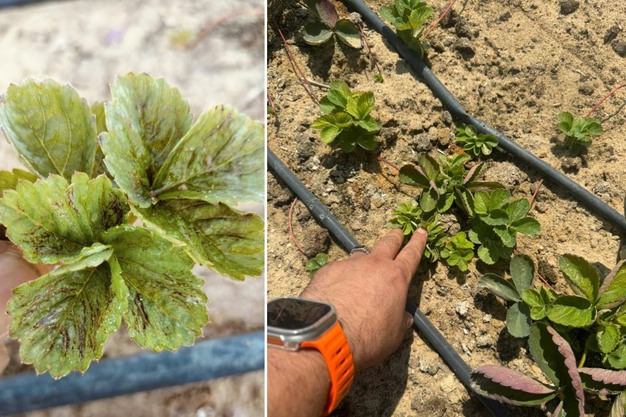Climate change is hitting North Africa harder than anywhere else in the world. In Egypt, climate change is manifesting in many forms and impacting several crops, one of the most sensitive being strawberries. Mohamed Ali Fahim, advisor to the Egyptian Minister of Agriculture, and Emad Mahdy, CEO of Fayruz Nurseries, take stock of an industry in difficulty and forecast a difficult season ahead.
Fahim, who is also Chairman of the Climate Change Information Center, describes how climate change is manifesting itself in Egypt: "We are increasingly witnessing sudden and sharp temperature swings, irregular rainfall distribution and extreme climatic accidents such as heat and cold waves. This has a physical impact on plants and soil quality."

Left: Mohamed Ali Fahim; right: Emad Mahdy.
Fahim continues, "Temperatures will continue to rise in Egypt. The last season (2023-2024) was particularly difficult for strawberry growers, and we can expect an even more difficult season for 2024-2025. We expect more heatwaves, sudden temperature changes, long dry spells, and surprising rainfalls. Summer will be late, bringing hot, dry winds and record temperatures. We're also expecting a short but very cold winter with episodes of hail and a rainy autumn."
On the production front, Mahdy sees the results on the ground. He described a particularly difficult season last year: "Strawberries were very sensitive to weather conditions. Due to the high temperatures, the fruit ripened too quickly, which reduced its size and quality. There has been a problem with the supply of exportable strawberries, particularly in markets where import standards are strict."

"The last season was marked by a drop in productivity and an increase in production costs," continues Mahdy. Irrigation, nutrition, and pest control programs had to be significantly intensified. The cost of plants has also risen for the same reasons, to 150 USD per thousand plants, given that one hectare of strawberries requires 70 to 95 thousand plants, depending on the variety. The cost of frozen strawberries has risen to 1,500 - 2,000 USD per tonne, compared with an average of 1,000 USD the previous season." In a sign of the rising cost of Egyptian strawberries, the price of frozen strawberries exceeded that of fresh strawberries for the first time last season.
Mahdy for his part is predicting a difficult season for strawberries next year. He says, "Climate change seriously hampers the strawberry industry in Egypt. It's already difficult for us in the nurseries. We can see that it's harder to maintain the plants, and above all more expensive. This will have repercussions on growers, with a total production cost of no less than 28 thousand USD per hectare, and then on selling prices. At this pace, I think fresh strawberry prices will be no less than 10 USD per kilo of fresh strawberries at the start of the season, and frozen strawberries would be at 2000-2500 USD per tonne."
For more information:
Emad Mahdy
Fayruz Nurseries
Tel: +201014040722
Email: [email protected]
Mohamed Ali Fahim
Egyptian Ministry of Agriculture
www.linkedin.com/in/prof-dr-mohamed-ali-fahim-73554915
